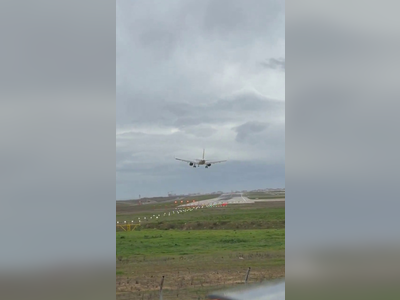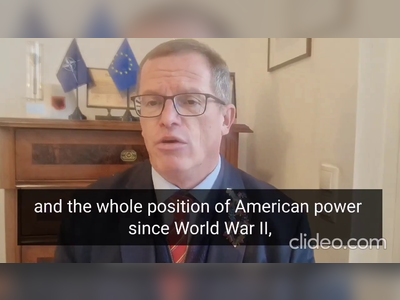Magdeburg Christmas Market Attack: Diplomatic Oversights and Missed Warnings
A tragic rampage in Germany raises questions about ignored intelligence and the complexities of global security coordination.
The heart of Germany was struck profoundly on a Friday night in December when the bustling Magdeburg Christmas market turned into a scene of chaos and tragedy.
A vehicle plowed through the festive crowd, leaving five dead, including a nine-year-old child, and injuring hundreds more.
The perpetrator, identified as Taleb al-Abdulmohsen, a Saudi Arabian national and medical professional, has been arrested and is facing charges of multiple counts of murder and attempted murder.
The incident highlights significant security lapses and diplomatic nuances, sparking a debate over missed warnings and governmental accountability.
Homeland security has been a pressing issue in many Western nations, but the revelations surrounding the Magdeburg attack have exposed particular vulnerabilities in Germany's approach to foreign intelligence.
In November 2023, German authorities reportedly received a vague warning from Saudi Arabia concerning the suspect.
The Bundeskriminalamt (BKA), Germany’s Federal Criminal Police Office, acknowledged receiving this unspecific alert and even commenced preliminary investigative measures.
However, due to the perceived ambiguity of the intelligence, more robust actions were not initiated.
Political figures have capitalized on these revelations to critique Germany's handling of security threats.
Sahra Wagenknecht, a prominent German politician, has demanded a comprehensive explanation from the federal interior ministry regarding the overlooked warnings.
Wagenknecht is pressing for accountability from Interior Minister Nancy Faeser, urging clarity on why previous threats were seemingly underestimated.
Amid Germany's fractured political environment, the tragedy’s aftermath saw right-wing groups, including extremist factions, seizing the narrative.
As memorial services were held in Magdeburg Cathedral, drawing thousands who came to mourn and find solace, far-right demonstrators exploited the national anguish to propagate their agenda, igniting further societal tension.
The regrettable occurrence taps into broader issues of immigration policies and integration challenges that Germany, like much of Europe, has been grappling with.
The influx of asylum seekers in past decades has been met with a complex assortment of integrational successes and societal friction, with incidents such as these fueling divisive debates.
Adding to the discourse, Elon Musk, a figure of global influence albeit often controversial, criticized Germany's government for what he calls "self-destructive empathy." Musk points out that the perpetrator's radical declarations were flagged by Saudi authorities and yet appeared insufficient to influence Germany’s immigration or security policies significantly.
The scale of the tragedy requires not just national sympathy but an intensified focus on how countries manage external threats via intelligence sharing and immigration strategies.
As the investigation unfolds, the broader implications regarding governmental efficacy and public safety policy reform remain a focal point for both the German public and international observers.
The haunting question posed during the memorial service, "Is there still a safe place?", resonates deeply as Germany reflects on its protectionist measures and seeks to learn from past oversights.
A vehicle plowed through the festive crowd, leaving five dead, including a nine-year-old child, and injuring hundreds more.
The perpetrator, identified as Taleb al-Abdulmohsen, a Saudi Arabian national and medical professional, has been arrested and is facing charges of multiple counts of murder and attempted murder.
The incident highlights significant security lapses and diplomatic nuances, sparking a debate over missed warnings and governmental accountability.
Homeland security has been a pressing issue in many Western nations, but the revelations surrounding the Magdeburg attack have exposed particular vulnerabilities in Germany's approach to foreign intelligence.
In November 2023, German authorities reportedly received a vague warning from Saudi Arabia concerning the suspect.
The Bundeskriminalamt (BKA), Germany’s Federal Criminal Police Office, acknowledged receiving this unspecific alert and even commenced preliminary investigative measures.
However, due to the perceived ambiguity of the intelligence, more robust actions were not initiated.
Political figures have capitalized on these revelations to critique Germany's handling of security threats.
Sahra Wagenknecht, a prominent German politician, has demanded a comprehensive explanation from the federal interior ministry regarding the overlooked warnings.
Wagenknecht is pressing for accountability from Interior Minister Nancy Faeser, urging clarity on why previous threats were seemingly underestimated.
Amid Germany's fractured political environment, the tragedy’s aftermath saw right-wing groups, including extremist factions, seizing the narrative.
As memorial services were held in Magdeburg Cathedral, drawing thousands who came to mourn and find solace, far-right demonstrators exploited the national anguish to propagate their agenda, igniting further societal tension.
The regrettable occurrence taps into broader issues of immigration policies and integration challenges that Germany, like much of Europe, has been grappling with.
The influx of asylum seekers in past decades has been met with a complex assortment of integrational successes and societal friction, with incidents such as these fueling divisive debates.
Adding to the discourse, Elon Musk, a figure of global influence albeit often controversial, criticized Germany's government for what he calls "self-destructive empathy." Musk points out that the perpetrator's radical declarations were flagged by Saudi authorities and yet appeared insufficient to influence Germany’s immigration or security policies significantly.
The scale of the tragedy requires not just national sympathy but an intensified focus on how countries manage external threats via intelligence sharing and immigration strategies.
As the investigation unfolds, the broader implications regarding governmental efficacy and public safety policy reform remain a focal point for both the German public and international observers.
The haunting question posed during the memorial service, "Is there still a safe place?", resonates deeply as Germany reflects on its protectionist measures and seeks to learn from past oversights.
Translation:
Translated by AI
AI Disclaimer: An advanced artificial intelligence (AI) system generated the content of this page on its own. This innovative technology conducts extensive research from a variety of reliable sources, performs rigorous fact-checking and verification, cleans up and balances biased or manipulated content, and presents a minimal factual summary that is just enough yet essential for you to function as an informed and educated citizen. Please keep in mind, however, that this system is an evolving technology, and as a result, the article may contain accidental inaccuracies or errors. We urge you to help us improve our site by reporting any inaccuracies you find using the "Contact Us" link at the bottom of this page. Your helpful feedback helps us improve our system and deliver more precise content. When you find an article of interest here, please look for the full and extensive coverage of this topic in traditional news sources, as they are written by professional journalists that we try to support, not replace. We appreciate your understanding and assistance.











